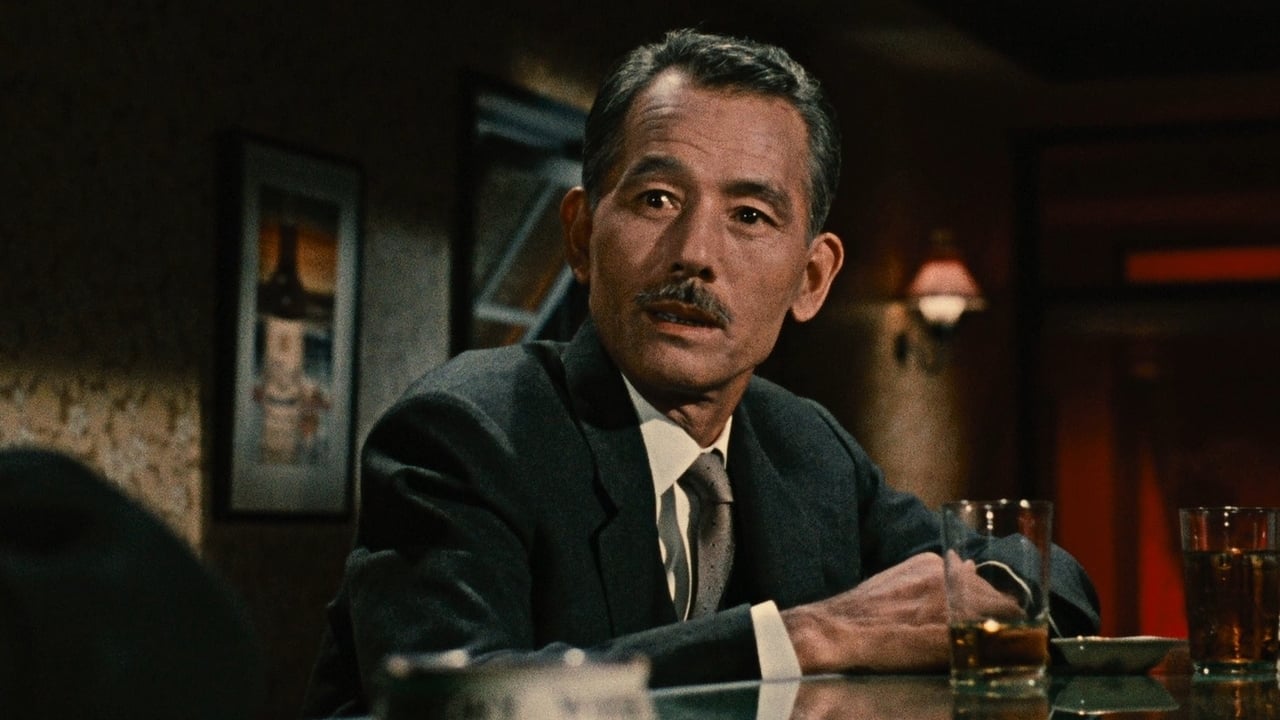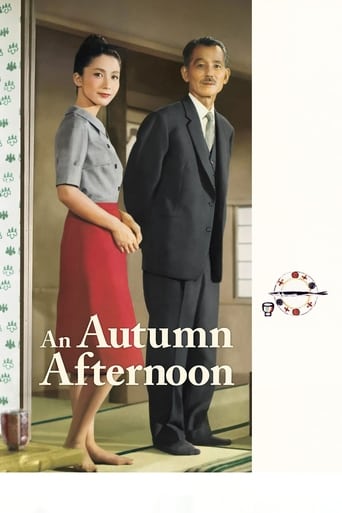

Very very predictable, including the post credit scene !!!
... View MoreAlthough it has its amusing moments, in eneral the plot does not convince.
... View MoreIn other words,this film is a surreal ride.
... View MoreTrue to its essence, the characters remain on the same line and manage to entertain the viewer, each highlighting their own distinctive qualities or touches.
... View MoreViewed on DVD. Restoration = ten (10) stars. The story line (yet again) deals with the conflicts arising from twenty-something, unmarried (and attractive) daughters living with (and focused on caring for) aging widowed fathers (who need to get on with their lives). To say that Director Yasujiro Ozu was obsessed with variation on this theme would be a vast understatement. He kept making essentially the same film over and over (trying to get things right or just stuck in a non-creative funk?) with translated titles often including the name of a season. Sort of like a TV series with one episode per season (pun intended). But the version presented in this film is the best of the bunch. The same old story line is significantly punched up with a robust, imaginative script offering a wide variety of plot-related and tangential events (including the game of Go which is rarely--if ever--seen in the "classical" Japanese cinema), and often amusing scenes populated by engaging character actors in cameo appearances. And the pacing is "brisk," at least by this Director's standards. The film also reflects fascinating aspects of contemporary Japanese life and culture (circa early 1960's). Many of the same actors and actresses appear in this film as they have in others of the series, but mostly play different roles (as is usually the case). The male lead actor (Chishu Ryu) turns in another stunning performance. Same interiors, scenes and sequence of scenes, and even shots and sequence of shots as employed in prior films. Music is heard during most of the movie, and resembles film scores from the European cinema and, especially, the Italian cinema of the era. Kimonos look exquisite, even the "everyday" ones. Cinematography (color) and sound are fine. Visual effects are primitive. Subtitles are indispensable for helping with the Western dialect used throughout the film. A keeper. WILLIAM FLANIGAN, PhD.
... View MoreIn the early 60's in Tokyo, the widower Hirayama (Chishû Ryû) is a former captain from the Japanese navy that works as a manager of a factory and lives with his twenty-four year-old daughter Michiko (Shima Iwashita) and his son Kazuo (Shin'ichirô Mikami) in his house. His older son Koichi (Keiji Sada) is married with Akiko (Mariko Okada) that are compulsive consumers and Akiko financially controls their expenses.Hirayama frequently meets his old friends Kawai (Nobuo Nakamura) and Professor Horie (Ryûji Kita), who is married with a younger wife, to drink in a bar. When their school teacher Sakuma (Eijiro Tono) comes to a reunion of Hirayama with old school mates, they learn that the old man lives with his daughter that stayed single to take care of him. Michiko lives a happy life with her father and her brother, but Hirayama feels that it is time to let her go and tries to arrange a marriage for her."Sanma no aji" is the last movie of the Japanese director Yasujiro Ozu about his favorite theme: family and human relationship. Actually he revisits in color thirteen years later, the theme of the wonderful "Banshun". Both story lines are about an old father that realizes that he can not hold his daughter with him anymore and she needs to get married with an arranged marriage as a natural order of life in the traditional Japan. The beautiful and touching story shows also the contrast between the traditional and the newer generation formed by consumers and is supported by awesome performances and the use of magnificent camera work, with symmetrically framed images. Last but not the least, it is impressive how the characters drink in this movie. My vote is eight.Title (Brazil):"A Rotina Tem Seu Encanto" ("The Routine Has its Charm")
... View MoreAn Autumn Afternoon, the final film by the great Yasujiro Ozu, is a portrayal of family interaction and conflict that provides a moving summation of a career that produced 53 films in 60 years. Similar in theme to his 1949 film Late Spring, a widowed father, Shuhei Hirayama, portrayed by the wonderful Chishu Ryu, wants his 24-year old daughter, Michiko, (Shima Iwashima) to marry but fears loneliness. After the death of her mother, as is traditional in Japanese families, Michiko has assumed her role, taking care of household chores and making sure that her father's needs are met. She feels no urge to marry and prefers to remain at home. Much of An Autumn Afternoon consists of small vignettes of family life. One of these involves Hirayama's son Koichi (Keiji Sada) and his wife Akiko (Mariko Okada. Both seem to mirror the encroaching consumer values of the new Tokyo lit up with neon lights, Coca-Cola signs, and rooftop golf. They bicker about finances, borrow money from their parents, and talk about buying expensive golf clubs and leather handbags on installment. The film has moments of delightful humor. Hirayama spends a great amount of time at a bar run by a woman who looks like his former wife, reminiscing about the good old days and listening to a military march from World War II. In one of the funniest scenes, he talks to a former shipmate who tells him that if Japan had won the war, American women would be playing Japanese musical instruments and wearing geisha style wigs and they both agree that it was better that Japan lost. When one of Hirayama's employees tells him she is leaving to get married, he begins to wonder whether or not it is also the time for Michiko. When Hirayama's friend Kawai (Nobuo Nakamura) proposes a match for Michiko, however, he does not tell his daughter about it, thinking there is plenty of time. The situation is crystallized when he has a reunion with an old school teacher Sakuma, (Eijiro Tono) known as "The Gourd" and notices how guilty his friend feels for not insisting that his daughter Tomoko marry when she had the opportunity. The result is an acceptance of the inevitable and the sadness that goes along with it. As An Autumn Afternoon ends, the camera pans around an empty room. We see an old man sitting on a chair, his head in his hands, weeping quietly. In his final moment of grace, Ozu has given us another experience that will last a lifetime.
... View MoreNot that I've seen too many Ozu films. This is only my third, after Bakushu and Tokyo Story. Both of those I found dull, even Tokyo Story, which is often considered one of the best films ever made. I don't know the critical reputation of Autumn Afternoon, but I liked it a lot. In fact, it continues with Ozus favorite themes (which I do sincerely hope aren't the same in all his films, and that I've just accidentally picked similar ones): aging, marriage, and Westernization. Autumn Afternoon is less pushy than those other two films. I thought that Ozu was making a lot of judgements in those films (although others have said that Ozu less judgemental than any other auteur; I don't believe it). In Autumn Afternoon, everything is observed without judgement. It's about life, it's about Japanese culture, and it's about human beings. I won't go into a deep examination of the film. I'd like to praise the musical score specifically, which is very charming and beautiful. Other than that, I'd just like to say that Autumn Afternoon is a delightful and touching film. See it if you're an Ozu fan, see it if you are not one. 9/10.
... View More